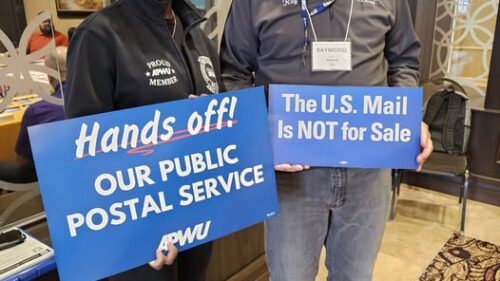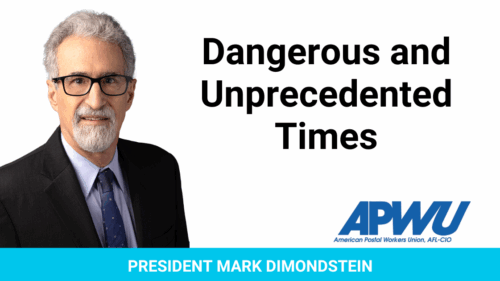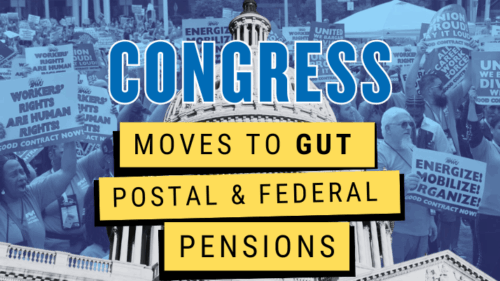APWU

Layoffs – Worst Case Scenario?
May 15, 2025“You and your coworkers are the Union! No matter your political party, now is the time to protect America’s Postal Service!” – Western Regional Coordinator Omar Gonzalez explains steps we can take to defend the public Postal Service and preserve our jobs.
magazineWestern RegionOmar M. Gonzalez
Threats of privatization, Department of Government Efficiency (DOGE) snooping, and government upheaval raise alarms while big banks like Wells Fargo outline what postal workers face, which is a “buy out” followed by layoffs.
More than 100,000 postal workers could face layoffs because of their tenure or employee status. Few APWU-represented postal workers have life-time protection against any involuntary layoff under the 1978 arbitrated collective bargaining agreement (CBA). The rest must earn their protection by completing six years of continuous service in pay status, with at least one hour or call-in guarantee for 20 of the 26 pay periods each year, per Article 6 of the CBA.
Forewarned Is For Armed
Per Article 6, management can “effect layoffs for lack of work or other legitimate reasons,” and the layoffs can be exercised in lieu of reassigning employees (excessing) under Article 12. Also, if Congress repeals or significantly relaxes the Private Express Statutes, which are a set of federal laws that prohibit private entities from carrying and delivering letter mail without paid U.S. postage, our
current layoff protections expire. For decades we have successfully fought off privatization, but now the snarling wolves are ready to bite. Former Postmaster General DeJoy’s agreement with DOGE claims to be driven by efficiency, but the reality equates to cuts undermining a struggling service.
How Layoff Occurs
Management identifies which employees will be laid off based on job classification in competitive areas and levels, such as Veterans’ Preference, seniority, tenure location, and more. The union is given a 90-day notice, while impacted employees only receive a 30-day notice.
Preconditions include a reduction in postal support employees (PSEs) and a 20-day posting of vacancies in the installation, or commuting area, for possible selection and reassignment. Severance pay and allowances are described in the Employee and Labor Relations Manual (ELM) Chapter 435. Health and life insurance coverage is subject to the ELM (see Article 6 for specifics).
The disruption that layoffs would inflict is real, but privatization or a merger into a federal department, like Commerce, is dastardly. Private companies do not have to retain our union contract. Current federal entities could void our contract and the rights of postal workers, like it did with TSA.
What You Can Do About It
You and your coworkers are the Union! No matter your political party, now is the time to protect America’s Postal Service!
Helping to protect the Peoples’ Post Office and YOUR job security is E.A.S.Y.:
Educate yourself and those around you about the threat of dismantling the USPS and how it would undermine service.
Assemble and protest! Let’s get the public on our side to stop any efforts to privatize or dismantle our Postal Service. Handout flyers and make signs for events at your local post offices.
Sell service, not postage when dealing with our public and their mail. Your job depends on it!
Your congressional representatives need to hear from you, your family, and neighbors, to support House Resolution 70 and Senate Resolution 147! Dial 844-402-1001 and urge them to protect USPS from privatization. It will only take three minutes.
For more ways to take action, visit apwu.org/action.
America’s Cornerstone
Our Post Office was established by the Continental Congress in 1775, enshrined into the Constitution by Congress in 1789, and signed into law in 1792. The history of the USPS is the history of the United States.
My fellow Coordinators Tiffany Foster, Amy Puhalski, AJ Jones, Yared Wonde, and I urge you to help us save the People’s Postal Service.
If you and every APWU member, with your coworkers, take action – the U.S. Postal Service will remain the Post Office of the People, By the People, and For the People. Will You stand up for our Post Office before it is too late? ■
Layoffs – Worst Case Scenario?0
Read More....
Due Process, Your Union Right
May 15, 2025Industrial Relations Director Charlie Cash explains due process, “one of our most important union rights. In the simplest of terms, it means you have the right to your ‘day in court’ to tell your side of the story and defend yourself if management wants to discipline you.”
magazineIndustrial RelationsCharlie Cash
No employee may be disciplined or discharged except for just cause — Those words come from Article 16 of the APWU’s main Collective Bargaining Agreement with the Postal Service and is consistent across all the contracts we have with the Postal Service and our private sector contractors. This language gives every employee, covered under one of our contracts, their rights to Due Process.
Due process is one of our most important union rights. In the simplest of terms, it means you have the right to your “day in court” to tell your side of the story and defend yourself if management wants to discipline you. There is much more to it than this, but in the end, you are able to have your chance to defend yourself before the Postal Service can take an adverse action against you.
Many of us have worked in industries where there is not a union and where we were at-will employees, meaning that there wasn’t a union contract that required just cause and due process procedures. One could be fired or have adverse actions taken against them without a chance to defend themselves. How unfair is it that you do not even get a chance to tell your side of the story or see the evidence against you?
I have represented hundreds of postal employees over the years in disciplinary proceedings from very minor issues to serious issues. As a union representative, I always ensure that the people I represent have their right to due process in the disciplinary process, no matter the violation. Every union-represented employee must be given these rights. It is a strongly held belief for me. If I am asked why I represent someone, I always make it clear that if I ever make the decision to turn my back on someone’s rights, that decision would render those provisions of our contract meaningless. Once a right is surrendered for one person, it starts the fall towards elimination of that right in its entirety for everyone.
But due process isn’t just something we all are entitled to in the grievance process. Due process is a fundamental right every person in this country has. The United States Declaration of Independence names three unalienable rights – life, liberty, and the pursuit of happiness. The Fourteenth Amendment to the Constitution disallows the government from infringing on those rights without due process. Everyone in this country has the right to defend themselves when they face losing any of these unalienable rights and more.
If you are charged with a crime, it is your right to defend yourself before a jury of your peers. If you were to have your driver’s license revoked, you have the right to a hearing. If your taxes are audited, you have a right to be heard and explain. If you are being evicted, a process must be followed before it happens. There are so many things where due process applies, that we probably take them for granted.
Today, this country faces the threat of losing our right to due process. Some people are being detained without any real due process. No matter what one’s political leanings are, I do not believe anyone thinks that our rights to due process should be stripped away from us.
Whether a person is accused of a crime, in the country illegally, protesting or saying things that are not popular, look different, or writes a news story that angers someone; that person must know that they will be granted their rights and have a chance to defend themselves in front of the appropriate authority before losing a single unalienable right. I will stand up for those rights for anyone in this country, even the people I disagree with. Will you stand with me? ■
Due Process, Your Union Right0
Read More....
Stepping Up Our Work to Face a New Threat
May 15, 2025Amid threats of privatization by the current presidential administration, A Grand Alliance to Save Our Public Postal Service has revitalized our campaign, bringing together allied coalitions to strengthen ties between postal workers and our community. Read how we’re taking action:
magazineA Grand Alliance to Save Our Public Postal Service
Our Alliance brings together hundreds of groups and individuals who are committed to preserving our public Postal Service. With the threat against the USPS greater than ever, we have been busy strengthening the ties between postal workers and our community.
Coalition Meeting
On March 19, we held a joint briefing with the Save the Post Office coalition to emphasize the threat to the USPS.
About 120 people from the many organizations that make up the coalition attended, including MoveOn, Indivisible, the Alliance for Retired Americans, and Public Citizen.
Melanie Campbell of the National Council on Black Civic Participation kicked off the event. APWU President Mark Dimondstein followed, laying out the threats and consequences of postal privatization.
Monique Morrissey, senior economist at the Economic Policy Institute, explained the impact of a postal sell-off. Shawn Sebastian of Rural Organizing discussed the direct impacts privatization would have on rural communities, while APWU member Brittany Price (Cleveland Area Local) gave a postal workers’ perspective.
Act Locally, Act Stronger
A highlight of APWU’s March 20 Day of Action was how many local organizations held events – more than 300 in total. Several Alliance members organized actions, including the Coalition of Black Trade Unionists, Jobs with Justice, and Indivisible.
Local events build stronger community support to oppose postal privatization. At a Globe-Miami Indivisible chapter event, an event organizer explained that having leaflets to give out to people in support of the rural Globe, AZ Post Office and having a toolkit with information was an excellent way to have great conversations with people regardless of who they voted for.
Individual community members and informal groups also held events. The organizer of an event in Lincoln County, ME, described how uniting makes us stronger: “The most important thing is that I met a bunch of new friends who care about my rural town like I do, and who, like me, know that our postal team are hard-working, dedicated neighbors who provide CRITICAL services to our community.”
APWU locals can continue building relationships by reaching out to local chapters of coalition members. Start with a phone call and identify your shared interests. Show how you can help them and ask for their help. If you need assistance reaching a local affiliate, please email us at: info@agrandalliance.org
A New Response to Renewed Threats
Considering the administration’s ongoing threats, our Alliance has updated its mission statement, warning that the U.S. Postal Service is:
“…under extreme assault by the current administration’s illegal hostile takeover of the independent agency. These actions are a huge step toward dismantling and selling off the USPS, in whole or in part, to private corporations, for private profit.” […]
“The public good must not be sacrificed for the sake of private investment and pro t. A strong public Postal Service is our democratic and constitutional right. Join us in the fight to improve, protect, and enhance vibrant public postal services now – and for many generations to come.” Read the full statement and see our list of supporters at: agrandalliance.org ■
The Post Offi ce Celebrates 250 Years of Service in July
Read More....
Maintaining Adequate Financial Controls, Policies, and Procedures
May 15, 2025Secretary-Treasurer Liz Powell shares the importance of maintaining adequate financial controls, policies and procedures as a local Trustee.
magazineSecretary-TreasurerElizabeth Powell
Whether local trustees are elected or appointed, the responsibilities of the position should not be a customary rubber stamp of local practices that conflict with the Labor-Management Reporting and Disclosure Act (LMRDA), Department of Labor (DOL), or IRS provisions. The Trustee position should not be a member of the local executive board, as it would cause a conflict of interest for the trustee and the financial oversight that is required of the position. The Trustee’s primary task is to ensure that all union resources (money and assets) are used for legitimate union purposes, as authorized by the membership, in accordance with your local constitution and bylaws. In addition, trustees should ensure that the local is complying with all legal requirements for financial reporting, recordkeeping, and bonding.
Each local affiliate should have provisions establishing set frequencies for trustees to conduct an audit. Local audits should be conducted annually, at a minimum. If there is no constitutional language, a motion is needed to establish set time frames. However, the constitution should be amended to provide for periodic internal audits. During the audit, trustees should review the disbursements, receipts, DOL and IRS compliance, and conduct an inventory of local assets. LMRDA provisions require officers and employees of the union to ensure that union funds and other assets are used solely for the benefit of the union and its members. Trustees are the first line of financial controls that a local should have in addition to various policies to ensure financial oversight is maintained.
Having policies and procedures in place defines acceptable and unacceptable practices. Written policies and procedures are clear and reflect the values and principles of your local. They ensure uniformity and consistency in decision making and operational procedures. They can clarify functions, responsibilities, and establish accountability. Policies and procedures assist with the day-to-day management of your local and can be invaluable in ensuring the local is running in an efficient and business-like manner. Problems can be managed quickly and effectively through existing policies.
When implementing policies, consider involving officers and stewards. This will promote awareness, understanding, and ownership when the policy is implemented. Present and explain the policy to your local membership and move to adopt the policy. Local union officers should consider implementing the following policies:
Travel and Expense
Leave Without Pay (LWOP) and Other Compensation
Credit Card Use
Additional policies could include a Computer Access and Internet policy, and a Local Grievance Handling policy. If you currently have policies in place, review them regularly to ensure that they are current and in line with changes within the local.
Finally, local officers should have computer back-up procedures in place for computer financial files, password access for QuickBooks, and other financial banking requirements. These and other important directives should be stored in a locked fireproof safe. ■
Maintaining Adequate Financial
Controls, Policies, and Procedures0

Are You Reaching Out with Best Practices for Member and Community Mobilizing?
May 15, 2025“To create a better world, we must have faith in each other and how our diverse beliefs, backgrounds, and perspectives unite in solidarity for justice.” – Vice President Debby Szeredy urges members to mobilize within our communities and spread our message to preserve the public Postal Service.
magazineVice PresidentDebby Szeredy
The work we do as postal workers to provide public services is a calling. Those who work for justice often make it their lifetime devotion. We become empowered through inspiring moments and teachings based on the principles of non-violence: helping workers in need, sacrificing for others, and having respect for others and for oneself. It is that work that ends up deepening our daily lives. We embrace compassion and peace to uplift our workers and our community. It is all about embracing a life of tolerance and equality, and that is why we have government, independent, and non-profit workers to unify all people.
Many activists from different generations are coming together to engage in collective strategies that create a sustainable movement to fight for the issues that matter the most to us. To create a better world, we must have faith in each other and how our diverse beliefs, backgrounds, and perspectives unite in solidarity for justice. Relationship- building creates a strong community. We must take the government out of the hands of the oligarchy and put it back in the hands of our beloved community.
One recent example of community coming together for the collective good occurred when Jalyna West, a union representative and the secretary-treasurer of the Mid- Hudson Area Local in New York, contacted the Civil Service Employees Association (CSEA) Region 3 to request permission to set up a table at their conference highlighting our fight against postal privatization. She and her husband, who is a CSEA member, worked to mobilize support to stop privatization of the Postal Service! They handed out flyers and collected 132 signatures in support of our public Postal Service, after just four hours of tabling at the CSEA Conference.
Speaking about the experience, Jalyna said, “I always look for opportunities to get the word out about the attack on the Postal Service. My husband has been a member of CSEA for 23 years and second VP of Local 550. [On] April 3rd, we set up our table after I had mentioned the attack on postal workers, and members asked about how they could help, and I mentioned I had a petition they could sign and fact sheets to hand out. A table was given to us to educate CSEA members. We were also able to get support from Jessica Ladlee of CSEA; Dutchess County Legislator Terracina Brown; Daniel Atonna, candidate for City of Poughkeepsie; Alyssa from MHA; Lisa Kaul, Veterans Programs; Aymar Blair, Dutchess Comptroller; Brenda Lawlor, Dutchess County Legislator; and Pat Ryan, our House Representative for New York.”
That’s what I call stepping out and mobilizing our community! We can win; we just need to step out to get the support! ■
Are You Reaching Out with
Best Practices for Member and
Community Mobilizing?0

Dangerous and Unprecedented Times
May 15, 2025“No matter our political beliefs or how we vote, we can and should find common ground in meeting the rising tide of fascism with an even greater tide of resistance of workers’ unity and solidarity.” APWU President Dimondstein shares his observations and thoughts about recent attacks on workers’ rights.
magazinePresidentMark Dimondstein
These are certainly dangerous and unprecedented times for all workers.
Many have heard the saying – if we don’t learn from history, we are bound to repeat it. But to learn from it, we must know it.
In January, the world commemorated the 80th anniversary of the Red Army’s liberation of the Nazi Auschwitz concentration camp toward the end of World War II. Yet a recent survey shockingly revealed that two-thirds of the U.S. population under the age of 42 knew nothing of this notorious fascist death camp where over one million people, mostly Jewish, were murdered in gas chambers.
How does a society turn to such barbarism, where human beings exterminate other human beings, justifying their heinous crimes behind the “big lie” that the white, blond-haired, blue-eyed, “Aryan race” is superior to “inferior” peoples?
History shows it never starts with death camps.
It starts with actions like those that are happening again today: demeaning and degrading others based on who they are, where they were born, or the color of their skin; labeling those with differing views as enemies of the state; calling immigrants trash; mocking disabled people; eliminating women’s fundamental rights; criminalizing protests; placing a president above the law; chilling free speech; bullying universities and lawyers; pardoning convicted insurrectionists; banning books; declaring the teaching of true history as unpatriotic; defying court orders; and attacking unions and workers’ rights.
Retired conservative Marine General John Kelly, Donald Trump’s longest-serving chief of staff during his first term, warned us during the 2024 election that Trump is essentially a fascist and prefers ruling as a dictator. The start of Trump’s second term confirms his warning. Workers should be deeply concerned.
History teaches us that fascism is a bitter enemy of working people. One of Hitler’s first acts was banning trade unions, seizing union assets, and arresting, imprisoning, and executing union leaders and activists. Millions of workers were forced into slave labor. Behind the Nazi call to “Make Germany Great Again,” and their military onslaught to rule the world and eliminate “inferior” peoples, over 85 million people were killed before world fascism was defeated.
History also provides a lesson on the importance of solidarity. Reverend Niemoller, a German Lutheran pastor who initially supported the rise of Hitler, resisted when the Nazis sought control over his church. He survived imprisonment and left us with this powerful message:
“First, they came for the Communists, and I did not speak up because I was not a Communist.
Then they came for the Socialists, and I did not speak up because I was not a Socialist.
Then they came for the trade unionists, and I did not speak up because I was not a trade unionist.
Then they came for the Jews, and I did not speak up because I was not a Jew.
And then when they came for me, there was no one left to speak for me.”
At the 2018 APWU National Convention, delegates wisely passed a resolution calling on members to “engage in the struggle to defend union rights and all democratic rights in opposition to rising fascism…”
Such democratic rights include defense of the public Postal Service, the rights of federal workers to join unions and bargain for a better life, voting rights – including Vote-by-Mail, of refugees seeking asylum, to protest and dissent, to due process, to public education, and to free speech.
Despite these challenging times, workers certainly are not helpless. No matter our political beliefs or how we vote, we can and should nd common ground in meeting the rising tide of fascism with an even greater tide of resistance of workers’ unity and solidarity. Fighting back and winning against growing tyranny can help ensure that the devastating history of German-led world fascism will not be repeated on our watch! ■
Dangerous and Unprecedented Times0
Read More....Contract Negotiations Between APWU and Postal Management Nearing ‘End Game’
May 14, 2025Contract Negotiations Between APWU and Postal Management Nearing ‘End Game’
Contract Negotiations
The APWU’s contract negotiations have been taking place as two other postal unions have also been in negotiations with management. The National Association of Letter Carriers finished their nearly two-year negotiations with a mediation-arbitration award issued by arbitrator Dennis Nolan on March 21. To view the award, visit: bit.ly/NALC-2025-Award
Then on April 18, the National Rural Letter Carriers Association reached a tentative agreement with postal management that is now in the ratification process. Their contract expired in May 2024, four months prior to the expiration of the Collective Bargaining Agreement (CBA) between the USPS and the APWU. The APWU has fully studied and discussed both of these results, as the outcome of negotiations with our sister postal unions certainly have an impact, positive or negative, on our negotiations with postal management.
The APWU is now seven months past the Sept. 20, 2024, expiration of our contract. As of May 14, the APWU is considering one of two paths: we will either have a new voluntary agreement, which will have been presented to the Rank & File Bargaining Advisory Committee, per the APWU Constitution, for its decision on whether to put it out to a vote of the entire membership. Or alternatively, we will have begun the process of interest arbitration to determine the provisions of a new contract.
“Negotiations are never easy and never will be. However, these negotiations were complicated by the almost two-year length of time it took our sister union, the NALC, to complete their negotiation process,” declared President Mark Dimondstein. “Most importantly, the political shift in the administration and ongoing assaults against federal workers, their unions, and union contracts, made negotiations even more difficult, as well as vital, to secure a new ratified and signed agreement.”
What a Difference Worker Power Through Our Union Makes!
APWU members often view the general wage increases (GWIs), which have been relatively modest over the last 20 years, as the sole compensation package of our Collective Bargaining Agreement. Our negotiated compensation package is much more, and includes:
• General Wage Increases
• Full Cost-of-Living Adjustments (COLAs)
• Regular Step Increases
• Night Differential
• Sunday Premium
• Overtime, including Penalty Pay
Just consider this one example of union-won results from the last nine years of three union contracts (2015, 2018, and 2021):
If an APWU-represented employee was hired in August of 2015 as a Level 6 career employee, this employee is now earning $31,000 more every year based on union-secured modest GWIs, full COLA, and regular Step Increases!(Excluding overtime, increases to the Thrift Savings Plan, etc.!) This amounts to an incredible 83% increase over those nine years!
Contract Negotiations Between APWU and Postal Management Nearing ‘End Game’0
Read More....
Join Webinar on Tuesday, May 13 at 7PM ET to Protect Our Postal Pensions!
May 12, 2025Postal and Federal Pensions are at risk – APWU will be hosting a Legislative webinar on Tuesday, May 13 at 7-8PM ET titled Protect Our Pensions: Fight Back Against Proposed Retirement Cuts to explain its devastating impacts and how we can combat them.
Postal and Federal Pensions are at risk – On April 30, the House Committee on Oversight and Government Reform voted to advance a number of significant cuts to the retirement benefits of postal and federal workers, that are now advancing through Congress.
APWU will be hosting a Legislative webinar on Tuesday, May 13 at 7-8PM ET titled Protect Our Pensions: Fight Back Against Proposed Retirement Cuts to explain its devastating impacts and how we can combat them. RSVP for the webinar by clicking here, and continue reading to find out more about its negative impacts if passed into law.
RSVP for Protect Our Pensions Webinar
Protect Our Pensions Webinar
Tuesday, May 13 7PM ET
Protect Our Pensions: Fight Back Against Proposed Retirement Cuts Webinar
On Tuesday, May 13 at 7PM ET, join APWU for a Legislative webinar titled, Protect Our Pensions: Fight Back Against Proposed Retirement Cuts where we will explain the devastating impacts of these cuts and how we are fighting back.
May 13, 2025 – 7:00PM to 8:00PMVirtual via ZoomNationalNoNo2025-05-14 00:00:00https://us02web.zoom.us/webinar/register/WN_TS54LXXqQHaMS0NDxN0-ZgProtect Our Pensions: Fight Back Against Proposed Retirement Cuts WebinarClick here to register.
For more ways you can take action, dial 844-402-1001 or visit apwu.org/call to urge your House Representative to oppose any cuts to postal and federal pensions.
00
February Contract Negotiations Update
February 13, 2025The difficult battle for a new APWU contract covering the wages, benefits, and rights of 200,000 postal workers continues. This current round of bargaining has a new and complicated ingredient: during the APWU’s ongoing negotiations with the Postal Service, the NALC reached a tentative agreement for their new contract in November 2024.
Contract Negotiations
The difficult battle for a new APWU contract covering the wages, benefits, and rights of 200,000 postal workers continues. This current round of bargaining has a new and complicated ingredient: during the APWU’s ongoing negotiations with the Postal Service, the NALC reached a tentative agreement for their new contract in November 2024. In January, the NALC completed the contract ratifi cation process, and the members soundly rejected their negotiated tentative agreement. As of today, Feb. 13, 2025, it appears they will likely move to interest arbitration to determine the terms of their new contract. Postal workers are weakened by the fact that the four postal unions negotiate separately. We do not have one postal union dealing with one postal management, nor do we jointly bargain together during negotiations. The APWU is actively pursuing our two-pronged strategy: keep meeting at the negotiating table to reach a new voluntary agreement, while also moving forward towards interest arbitration. Interest arbitration means that a neutral, third-party arbitrator will make the fi nal and binding decision on a new contract, including our wages and benefi ts, after a series of hearings and presentations. “While we are doing everything in our power to reach a voluntary agreement that rewards our members for their dedication and hard work, given the progress of negotiations, it is likely we will soon declare an impasse and head into interest arbitration. Stay tuned!” said APWU President Mark Dimondstein. We will continue to provide regular updates on the status of APWU negotiations on apwu.org, and through news bulletins, emails, text, social media, videos, and podcasts. In the meantime, stay union strong! Wear your union gear, join contract rallies, and build union power by signing up non-members. Send management, and any arbitrator, the message that we are indeed united in our demands for a good new contract. “Union Proud, Say it Loud!”
The difficult battle for a new APWU contract covering the wages, benefits, and rights of 200,000 postal workers continues. This current round of bargaining has a new and complicated ingredient: during the APWU’s ongoing negotiations with the Postal Service, the NALC reached a tentative agreement for their new contract in November 2024.0
Read More....